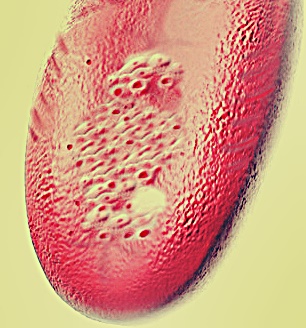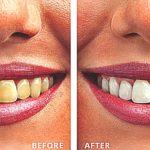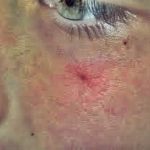When your tongue is peeling you will obviously be scared and want to know what may be happening. A peeling tongue is probably not painful, however, it may make talking and eating to feel awkward. It is common to have tongue peeling after you have eaten very salty foods, sour candy, and vinegar chips. In people with geographic tongue, it is likely they have peeling of their tongue. Pregnancy, STDs, and fungal infections may present with signs like peeling of tongue.
Sometimes, when there is white coating on tongue, people may describe it as tongue peeling. You can look at the appearance of your tongue in the morning when you wake up. Just get to the mirror near the window where there is plenty of light and check your tongue to see if there are signs of peeling. When examining the tongue in a mirror, ensure that it’s relaxed and flat when extended. Make sure that you don’t brush your teeth because it can take away any evidence of peeling tongue.

Why is my Tongue Peeling?
The body has a mechanism to get rid of damaged and dead skin cells, that’s skin peeling. When you eat spicy foods or acidic foods for instance, they damage tongue skin layer causing it to peel off. This is a defense mechanism to renew the skin surface. Sometimes, an underlying cause may contribute to the problem. Tongue peeling causes include:
STD infections: STDs and STIs are conditions passed from an individual to another through sexual contact. It might be through vaginal, oral, or sexual contact and such conditions can contribute to tongue peeling. People should be tested before they engage in sexual activities. Symptoms of sexually transmitted diseases or sexually transmitted infections are burning during urination, chronic pain, discharge coming from the penis, itching around a woman’s vagina, pain during sex, pain in anus, sore throat, scaly rash occurring on palms and soles, dark urine, night sweats, swollen glands, weight loss, and warts around genitals.
Foods you eat: Taking acidic foods like tomatoes and sauces derived from tomatoes, spicy foods like salsa, jalapeno and chili, carbonated soft drinks and others may trigger peeling of the tongue. Vinegar chips are also associated with a peeled tongue.
Geographic tongue: Although a harmless condition, geographic tongue can make the tongue to appear as though it’s peeling. Usually, the tongue has papillae that appear as pinkish-whitish bumps. These are short, projections looking like hair. In people with geographic tongue, their tongue does not have papillae and it looks like some smooth red islands with somehow raised borders. The patches may be known as lesions and they make the tongue to look like a map hence the name geographic tongue.

The lesions may also be referred to as benign migratory glossitis and they will attack one area and after healing move to another part of an individual’s tongue. The condition may not lead to an infection or even cancer and tends to remain harmless. However, it can cause some increased sensitivity and discomfort when an individual takes certain substances.
A person with geographic tongue will have smooth, red uneven patches on the tongue’s top or sides. There are also changes in size, shape, and location of the patches or lesions. Discomfort, burning sensation, or pain may be felt when a person takes salty, spicy, and acidic foods.

Allergy reactions: A tongue may peel when it gets in contact with an allergen. The body will become sensitive to the allergen. Foods, pollen, medicine, and other substances can trigger allergic reactions that come along with symptoms like red eyes, nasal congestion, skin itching, peeling tongue, swollen tongue, rashes on face and neck.
Thermal burn: Your tongue may peel when it burns from taking hot foods and drinks. It is a common phenomenon and usually involves damage to the tongue’s skin layer.
Pregnancy: At time of pregnancy, there are a lot of emotional and physical changes happening in a woman’s body. The changes may be regulated by hormones. Dr. Barbara j. Steinberg of the Medical College of Pennsylvania points out that women tend to have special needs than men. Hormonal surges in women can bring about many dental problems that manifest in form of puffy gums, bacterial plaque, peeling tongue, and dry mouth. Hormonal shifts are likely to ‘hot’ women in their mouth.

Tongue Peeling With Discoloration
You may have the tongue peeling along with changes in color. Having pale red or bright pink tongue is considered normal. However, if you have bright red or white shades, it could indicate a health problem. White or pale tongue accompanied by peeling signified problems with the circulation, for example anemia. This causes reduction in red cells and oxygen. It may also cause adrenal problems. Often white or pale tongue may indicate a chronic illness affecting the digestive tract or low thyroid function. If you have a peeling tongue that is redder than usual, it may indicate excess acid in an individual’s body or inflammation and dehydration. It could also indicate a bacterial infection.
People with poor eating habits or who take stimulants may also have their tongue peel. Having red tipped tongue that occurs with some pinkish shades could mean a cardiac or thyroid problem. When the redness is more on the tongue’s side, it may indicate gallbladder or liver problems. Having excess redness occurring on the tongue’s center area could mean stomach problems. A purple tongue occurring along with peeling indicates a condition known as blood stasis or pooling of blood. It may also point to a kidney condition.

Treating Tongue Peeling
An individual with tongue peeling will have treatment based on what’s causing the problem. Sometimes, no treatment may be needed for example, when you have peeling due to taking hot foods, or spicy and acidic foods. The moment you stop taking those foods, the tongue will regenerate new skin cells to take up the space for the damaged or dead ones. Other conditions may require medication or even surgery. A differential diagnosis helps rule out the possibility of certain conditions causing the symptoms. For example, a peeling tongue that appears white may indicate leukoplakia or contact inflammation arising from dentures. A biopsy may be taken to study the tongue’s skin tissue under a microscope.
Rinsing the mouth with saline water can help remove dead cells and debris that cause tongue peeling. Probiotics containing live bacteria can help regulate harmful bacteria in a person’s mouth or gut. You may also want to keep your body hydrated.
If it’s a case of STDs or STIs, then treatment is offered based on the strains of bacteria, fungus, or virus causing the diseases and infections.



